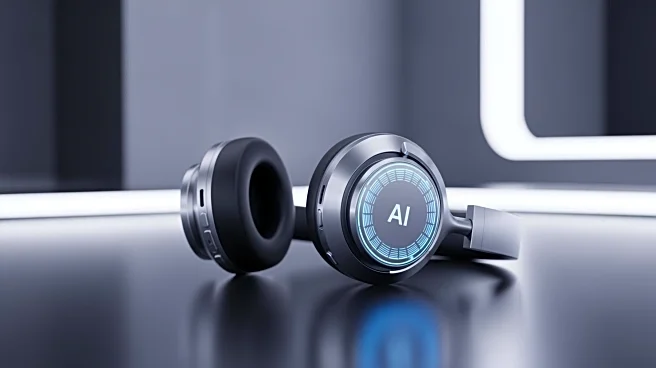What's Happening?
Headphones are increasingly being integrated with artificial intelligence (AI) capabilities, transforming them from simple audio devices into sophisticated AI wearables. Companies like Apple, Google, and Samsung are leading this evolution by incorporating
AI-specific features into their headphones. For instance, Apple's AirPods Pro 3 now offer AI-powered live translation, while Google's Pixel Buds 2 include the Gemini AI assistant, which can perform tasks like summarizing emails. These advancements allow headphones to dynamically adjust audio settings and provide alerts for environmental cues, such as traffic dangers or someone calling your name. This shift is driven by the proximity of headphones to the ears, making them ideal for receiving and transmitting sensory data.
Why It's Important?
The integration of AI into headphones represents a significant shift in how consumers interact with technology. As headphones become more than just audio devices, they offer a familiar and widely accepted platform for AI interaction, potentially increasing user engagement with AI technologies. This development could lead to broader adoption of AI in everyday life, as headphones are already a common accessory. The market for headphones is projected to grow significantly, reaching over $100 billion by the early 2030s, indicating strong consumer interest and potential profitability for companies investing in AI-enhanced audio devices. This trend also highlights the potential for AI to be seamlessly integrated into existing technologies, rather than relying solely on new, unfamiliar devices.
What's Next?
As AI capabilities in headphones continue to advance, we can expect further innovations in how these devices interact with users and their environments. Companies may explore additional AI features, such as gesture recognition or more advanced personal assistant functionalities. The success of AI-enhanced headphones could influence the development of other wearable technologies, encouraging manufacturers to integrate AI into a wider range of products. Additionally, as consumer demand for AI features grows, companies may face increased competition to offer the most advanced and user-friendly AI experiences. This could lead to rapid advancements in AI technology and its applications in consumer electronics.
Beyond the Headlines
The rise of AI in headphones also raises questions about privacy and data security, as these devices collect and process personal data to function effectively. Manufacturers will need to address these concerns to maintain consumer trust. Furthermore, the social acceptance of AI-enhanced headphones could pave the way for broader acceptance of AI in other aspects of daily life, potentially influencing cultural attitudes towards technology. As AI becomes more integrated into personal devices, ethical considerations regarding data usage and AI decision-making will become increasingly important.















